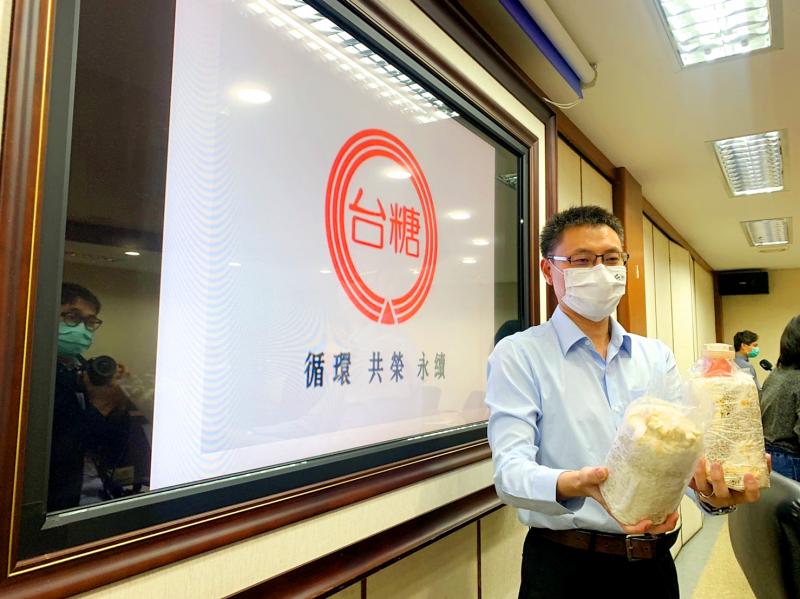Taiwan Sugar Corp (Taisugar, 台糖) is seeking to expand its award-winning program that turns sugarcane waste into mushroom cultivation packs, the state-run company said.
The company yearly turns 400 tonnes of sugarcane byproduct into cultivation packs, Taisugar said at a news conference in Taipei on Thursday.
The packs contain 50 percent sugarcane waste and 50 percent sawdust, which the company determined to be the “optimal” ratio after experiments, it said, adding that the packs are then “rented” to mushroom farmers.

Photo: Lin Jing-hua, Taipei Times
“The reason we say ‘rent’ rather than sell is because we take back the used packs at the end of the harvest cycle,” Taisugar circular economy head Jan Chang (張建成) said. “We then further compost the used packs with other materials and sell it as compost.”
“This brings additional profit to Taisugar and ensures the packs are not irresponsibly disposed of,” he said, adding that some unscrupulous farmers dump used packs irresponsibly.
“We are trying to create a closed circle,” he said.
Farmers receive a double benefit from the program, as sugarcane waste is supplied to them at NT$2.5 per kilogram compared with about NT$3.4 for hardwood sawdust, which is usually used for growing king oyster mushrooms.
They also receive a 20 to 30 percent boost in yield compared with using pure sawdust, Taisugar said.
The company produces 50,000 tonnes of sugar per year, resulting in 130,000 to 150,000 tonnes of sugarcane waste. About 70 percent of the waste is burnt to generate electricity and the rest are composted, leaving room for growth in the cultivation pack program.
“There’s definitely demand for more from farmers,” Chang said.
Taisugar is working on different ways to expand the program, including cultivation packs with a higher percentage of sugarcane waste and recycling the plastic bags that hold the substrate.
“The technology is there to recycle the plastic bags used to make the cultivation packs, but we are still working on the economic feasibility,” Chang said.
While cane sugar once played a vital role in the growth of the nation’s economy, acreages have been declining as the cost of producing sugar has increased compared with imported sugar.
“We cannot compete on price with a country like Brazil with huge farms that allow for mechanized harvesting, but sugar is a necessity and we will keep some domestic production for food security reasons,” Taisugar secretariat director Hsiao Kuang-hung (蕭光宏) said.
The company’s cultivation pack program has won top honors in the “innovative service” category of the Taiwan Circular Economy Awards last month.
However, the program itself dates back to 2014.
“Before the circular economy became a buzzword, Taisugar has been working on minimizing our environmental impact and maximizing our resources,” Hsiao said.

South Korea’s equity benchmark yesterday crossed a new milestone just a month after surpassing the once-unthinkable 5,000 mark as surging global memory demand powers the country’s biggest chipmakers. The KOSPI advanced as much as 2.6 percent to a record 6,123, with Samsung Electronics Co and SK Hynix Inc each gaining more than 2 percent. With the benchmark now up 45 percent this year, South Korea’s stock market capitalization has also moved past France’s, following last month’s overtaking of Germany’s. Long overlooked by foreign funds, despite being undervalued, South Korean stocks have now emerged as clear winners in the global market. The so-called “artificial intelligence

‘SEISMIC SHIFT’: The researcher forecast there would be about 1.1 billion mobile shipments this year, down from 1.26 billion the prior year and erasing years of gains The global smartphone market is expected to contract 12.9 percent this year due to the unprecedented memorychip shortage, marking “a crisis like no other,” researcher International Data Corp (IDC) said. The new forecast, a dramatic revision down from earlier estimates, gives the latest accounting of the ongoing memory crunch that is affecting every corner of the electronics industry. The demand for advanced memory to power artificial intelligence (AI) tasks has drained global supply until well into next year and jeopardizes the business model of many smartphone makers. IDC forecast about 1.1 billion mobile shipments this year, down from 1.26 billion the prior

People stand in a Pokemon store in Tokyo on Thursday. One of the world highest-grossing franchises is celebrated its 30th anniversary yesterday.

Chinese artificial intelligence (AI) start-up DeepSeek’s (深度求索) latest AI model, set to be released as soon as next week, was trained on Nvidia Corp’s most advanced AI chip, the Blackwell, a senior official of US President Donald Trump’s administration said on Monday, in what could represent a violation of US export controls. The US believes DeepSeek will remove the technical indicators that might reveal its use of American AI chips, the official said, adding that the Blackwells are likely clustered at its data center in Inner Mongolia, an autonomous region of China. The person declined to say how the US government received